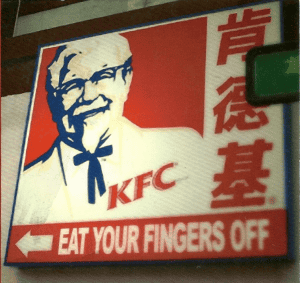Top 10 Advertisement Translation Mistakes
Since advertising experts, working in their own native language, still often struggle in getting the words and message right, how surprising is it that linguists face substantial challenges in translating highly colloquial and emotive advertising documents? Not getting the message quite right is one thing, but there are well-documented cases of things going wrong to the worst extent imaginable.
Here are the top 10 examples of advertisement translations going hilariously wrong:
- When Coca-Cola was first introduced in China and the said product was first translated into Chinese, the characters used for the sounds Ke-kou-ke-la can mean “female horse stuffed with wax” or “bite the wax tadpole”. Malicious rumours have it that this hinted at the secret ingredients, but be that as it may, initial sales of Coca-Cola in China were apparently poor as a consequence. Odd, really, in a country where grated dried animal penises are routinely added to spirits.
- Schweppes tonic water was reportedly mistranslated as “Schweppes Toilet Water” in Italian. Well, yes, it IS a pretty strange tasting drink….
- KFC’s slogan “Finger Licking Good” was translated as “eat your fingers off” in China. Given the quality and actual contents of the ‘chicken’ nuggets in question, that might well have been the best advice.
- When McDonald’s Big Mac was first introduced in France, it was translated as “Gros Mec”, which means “Big Pimp” or “Big guy” … and you can see his girls waddling down your local high street.
- Kagome is one of the largest producers of vegetable and fruit drinks in Japan. When the company attempted to introduce their product in Brazil, their brand name sounded exactly like “I just pooped in my pants” in Portuguese. Yes, our drink can REALLY help you remain regular.
- Coors brewing’s slogan “Turn it loose” was clearly an effective slogan for English speaking audiences. However, when the company decided to introduce the product into Spanish markets, the English slogan didn’t quite have the same positive effect to Spanish buyers. “Turn it loose” was far too literally translated into (the somewhat plausible) “Get Diarrhoea”.
- Starbucks missed the fact that in German, the word “latte” translates into “erection”. When Starbucks flaunted their “morning latte break” slogan in German, minds started to wander (“Morgen Helga, I’ll have an extra shot with my morning erection, please”).
- The English slogan for Salem cigarettes, “Salem – Feeling Free” was translated into Japanese as, “When smoking Salem, you feel so refreshed that your mind seems to be free and empty”. An attempt to break into the competitive student smoker market, perhaps?
- Frank Perdue’s chicken slogan, “it takes a strong man to make a tender chicken” was effective for native English consumers. However, when it was translated into Spanish it came out perhaps even more effectively as: “it takes an aroused man to make a chicken affectionate”. Lots of very happy chickens in Spain now, we hear.
- Pepsi’s slogan “Come alive with the Pepsi Generation” translated into Chinese as “Pepsi brings your ancestors back from the grave”. Yikes, will I have to hand my inheritance back to granny?!
In general, accurate translation of advertising materials is clearly essential for companies looking to expand their businesses successfully in international markets. On the other hand, in the spirit of “there is no such thing as bad publicity”, a few of the above translation mistakes may actually have worked in the brand’s favour, by creating much more “buzz” for the product than a better translation would have done, and in that sense some terrible translation mistakes in adverts may have worked out in the end, despite the advertisers’ ‘best’ efforts.
It probably still means, however, that the advertising execs leading these projects had to join the queue at their local job centres as a result.
About the Author
Rossella Mastropietro
Rossella is our Head of Office and Operations. She brings over 10 years of experience in the translation industry, helping our customers communicate seamlessly across cultural and linguistic boundaries. Rossella joined Rosetta in 2014 after completing an MSc in Translation Technology at Imperial College London… Read Full Bio










